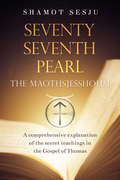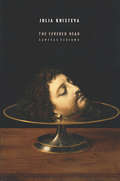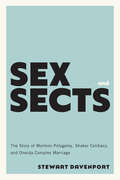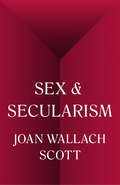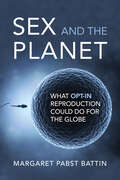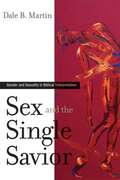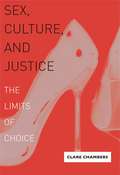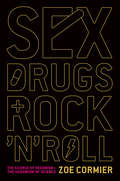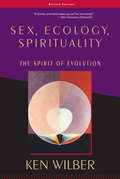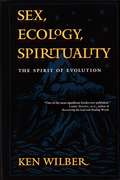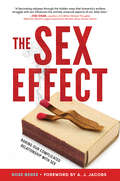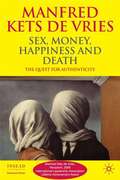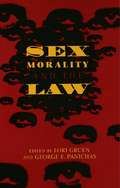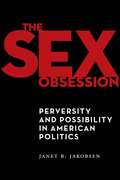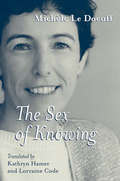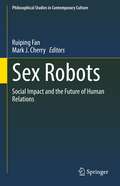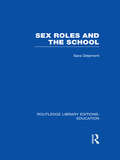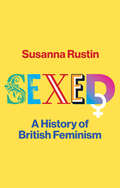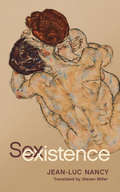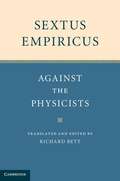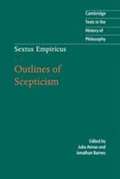- Table View
- List View
Seventy-seventh Pearl: The Maothsjesshoum
by Shamot SesjuThrough tearful eyes a young girl asked Pope Francis; why does God allow children to suffer? The answer revealed what atheists have long suspected - theists rely on blind faith. This book opens the readers' eyes. It is the logical, undeniable truth. In the Gospel of Thomas, Jesus promises that people who discover the meaning of his sayings would not taste death. Since the time Thomas recorded these sayings people have tried to unravel their meaning. The Seventy-seventh Pearl: The Maothsjesshoum is the second coming. It is the completion of Jesus' purpose in this world. The Seventy-seventh Pearl lives - in you.
The Severed Head: Capital Visions (European Perspectives: A Series in Social Thought and Cultural Criticism)
by Julia KristevaInformed by a provocative exhibition at the Louvre curated by the author, The Severed Head unpacks artistic representations of severed heads from the Paleolithic period to the present. Surveying paintings, sculptures, and drawings, Julia Kristeva turns her famed critical eye to a study of the head as symbol and metaphor, as religious object and physical fact, further developing a critical theme in her work--the power of horror--and the potential for the face to provide an experience of the sacred.Kristeva considers the head as icon, artifact, and locus of thought, seeking a keener understanding of the violence and desire that drives us to sever, and in some cases keep, such a potent object. Her study stretches all the way back to 6,000 B.C.E., with humans' early decoration and worship of skulls, and follows with the Medusa myth; the mandylion of Laon (a holy relic in which the face of a saint appears on a piece of cloth); the biblical story of John the Baptist and his counterpart, Salome; tales of the guillotine; modern murder mysteries; and even the rhetoric surrounding the fight for and against capital punishment. Kristeva interprets these "capital visions" through the lens of psychoanalysis, drawing infinite connections between their manifestation and sacred experience and very much affirming the possibility of the sacred, even in an era of "faceless" interaction.
The Severity of God
by Paul K. MoserThis book explores the role of divine severity in the character and wisdom of God, and the flux and difficulties of human life in relation to divine salvation. Much has been written on problems of evil, but the matter of divine severity has received relatively little attention. Paul K. Moser discusses the function of philosophy, evidence and miracles in approaching God. He argues that if God's aim is to extend without coercion His lasting life to humans, then commitment to that goal could manifest itself in making human life severe, for the sake of encouraging humans to enter into that cooperative good life. In this scenario, divine agapē is conferred as free gift, but the human reception of it includes stress and struggle in the face of conflicting powers and priorities. Moser's work will be of great interest to students of the philosophy of religion, and theology.
Sex and Sects: The Story of Mormon Polygamy, Shaker Celibacy, and Oneida Complex Marriage (American Spirituality)
by Stewart DavenportWith a revolution behind them, a continent before them, and the First Amendment protecting them, religio-sexual pioneers in antebellum America were free to strike out on their own, breaking with the orthodoxies of the past. Shakers followed the ascetic path; Oneida Perfectionists accepted sex as a gift from God; and Mormons redefined marriage in light of new religious revelations that also redefined God, humankind, spirit, and matter. Sex became a powerful way for each group to reinforce their sectarian identity as strangers in a strange land. Sex and Sects tells the story of these three religiously inspired sexual innovations in America: the celibate lifestyle of the Shakers, the Oneida Community’s system of controlled polyamory, and plural marriage as practiced by the Mormons. Stewart Davenport analyzes why these bold experiments rose and largely fell over the course of the nineteenth century within the confines of the new American republic. Moving beyond a social-scientific lens, Davenport traces for the first time their fascinating shared trajectory as they emerged, struggled, institutionalized, and declined in tandem—and sheds historical light on the way in which Americans have discussed, contested, and redefined the institutions of marriage and family both in our private lives and in the public realm.
Sex and Secularism
by Joan Wallach ScottHow secularism has been used to justify the subordination of womenJoan Wallach Scott’s acclaimed and controversial writings have been foundational for the field of gender history. With Sex and Secularism, Scott challenges one of the central claims of the “clash of civilizations” polemic—the false notion that secularism is a guarantee of gender equality.Drawing on a wealth of scholarship by second-wave feminists and historians of religion, race, and colonialism, Scott shows that the gender equality invoked today as a fundamental and enduring principle was not originally associated with the term “secularism” when it first entered the lexicon in the nineteenth century. In fact, the inequality of the sexes was fundamental to the articulation of the separation of church and state that inaugurated Western modernity. Scott points out that Western nation-states imposed a new order of women’s subordination, assigning them to a feminized familial sphere meant to complement the rational masculine realms of politics and economics. It was not until the question of Islam arose in the late twentieth century that gender equality became a primary feature of the discourse of secularism.Challenging the assertion that secularism has always been synonymous with equality between the sexes, Sex and Secularism reveals how this idea has been used to justify claims of white, Western, and Christian racial and religious superiority and has served to distract our attention from a persistent set of difficulties related to gender difference—ones shared by Western and non-Western cultures alike.
Sex and the Planet: What Opt-In Reproduction Could Do for the Globe (Basic Bioethics)
by Margaret Pabst BattinWhat if human reproduction was always elective? A prominent bioethicist speculates about the possibilities—and the likely consequences.What would the world be like if all pregnancy was intended, not unintended as it is nearly half the time now? Considerably better, Margaret Pabst Battin suggests in Sex and the Planet, a provocative thought experiment with far-reaching real-world implications. Many of the world&’s most vexing and seemingly intractable issues begin with sex—when sperm meets egg, as Battin puts it—abortion, adolescent pregnancy, high-risk pregnancy, sexual violence, population growth and decline. Rethinking reproductive rights and exposing our many mistaken assumptions about sex, Sex and the Planet offers an optimistic picture of how we might solve these problems—by drastically curtailing unintended pregnancies using currently available methods.How we see this picture—as recommendation, prediction, utopian fantasy, totalitarian plot, hypothetical conjecture, or realistic solution—depends to a great degree on which of thirteen problematic assumptions we maintain, assumptions Battin works to identify and challenge. Taking on sensitive topics like abortion and rape and religious issues around contraception, she shows how a fully informed, nonideological approach could defuse much of the friction such issues tend to generate. Also, in her attention to male contraception and the asymmetry of female and male reproductive control, she pulls in the 50 percent of the human race—those with Y chromosomes—largely left out of discussions of reproductive health. Sex and the Planet, finally, takes a global view, inviting us to consider a possible—even plausible—reproductive future.
Sex and the Single Savior: Gender and Sexuality in Biblical Interpretation
by Dale B. MartinProbing into numerous questions about gender and sexuality, Dale Martin delves into the biblical texts anew and unearths surprising findings. <p><p> Avoiding preconceptions about ancient sexuality, he explores the ethics of desire and marriage and pays careful attention to the original meanings of words, especially those used as evidence of Paul's opposition to homosexuality. For example, after a remarkably faithful reading of the scriptural texts, Martin concludes that our contemporary obsession with marriage--and the whole search for the "right" sexual relationships--is antithetical to the message of the gospel. <p><p> In all of these essays, however, Martin argues for engaging Scripture in a way that goes beyond the standard historical-critical questions and the assumptions of textual agency in order to find a faith that has no foundations other than Jesus Christ.
Sex, Culture, and Justice: The Limits of Choice (G - Reference, Information and Interdisciplinary Subjects)
by Clare ChambersAutonomy is fundamental to liberalism. But autonomous individuals often choose to do things that harm themselves or undermine their equality. In particular, women often choose to participate in practices of sexual inequality—cosmetic surgery, gendered patterns of work and childcare, makeup, restrictive clothing, or the sexual subordination required by membership in certain religious groups. In this book, Clare Chambers argues that this predicament poses a fundamental challenge to many existing liberal and multicultural theories that dominate contemporary political philosophy.Chambers argues that a theory of justice cannot ignore the influence of culture and the role it plays in shaping choices. If cultures shape choices, it is problematic to use those choices as the measure of the justice of the culture. Drawing upon feminist critiques of gender inequality and poststructuralist theories of social construction, she argues that we should accept some of the multicultural claims about the importance of culture in shaping our actions and identities, but that we should reach the opposite normative conclusion to that of multiculturalists and many liberals. Rather than using the idea of social construction to justify cultural respect or protection, we should use it to ground a critical stance toward cultural norms. The book presents radical proposals for state action to promote sexual and cultural justice.
Sex, Culture, and Justice: The Limits of Choice
by Clare ChambersAutonomy is fundamental to liberalism. But autonomous individuals often choose to do things that harm themselves or undermine their equality. In particular, women often choose to participate in practices of sexual inequality—cosmetic surgery, gendered patterns of work and childcare, makeup, restrictive clothing, or the sexual subordination required by membership in certain religious groups. In this book, Clare Chambers argues that this predicament poses a fundamental challenge to many existing liberal and multicultural theories that dominate contemporary political philosophy.Chambers argues that a theory of justice cannot ignore the influence of culture and the role it plays in shaping choices. If cultures shape choices, it is problematic to use those choices as the measure of the justice of the culture. Drawing upon feminist critiques of gender inequality and poststructuralist theories of social construction, she argues that we should accept some of the multicultural claims about the importance of culture in shaping our actions and identities, but that we should reach the opposite normative conclusion to that of multiculturalists and many liberals. Rather than using the idea of social construction to justify cultural respect or protection, we should use it to ground a critical stance toward cultural norms. The book presents radical proposals for state action to promote sexual and cultural justice.
Sex, Drugs, and Rock 'n' Roll: The Science of Hedonism and the Hedonism of Science
by Zoe CormierFull of noise and color, Sex, Drugs, and Rock ’n’ Roll looks at scientists and their craft, how hedonistic impulses inform our highest pursuits, and how the renegades of science have illuminated the secrets of our deepest impulses. It is a fascinating tale of scientists on the edge, experimenting on themselves and others, that asks the big (and strange) questions about what it means to be human, about consciousness and happiness, the future and past of our species, our scientific knowledge, and our culture. Not to mention our parties. It will pull you in and gross you out, but it never loses sight of the stories, ideas, and scientific discoveries that make sex, drugs, and rock ’n’ roll so timeless.
Sex, Ecology, Spirituality: The Spirit of Evolution, Second Edition
by Ken WilberIn this tour de force of scholarship and vision, Ken Wilber traces the course of evolution from matter to life to mind and describes the common patterns that evolution takes in all three of these domains. From the emergence of mind, he traces the evolution of human consciousness through its major stages of growth and development. He particularly focuses on modernity and postmodernity: what they mean; how they impact gender issues, psychotherapy, ecological concerns, and various liberation movements; and how the modern and postmodern world conceive of Spirit. This second edition features forty pages of new material, new diagrams, and extensively revised notes.
Sex, Ecology, Spirituality: The Spirit of Evolution
by Ken Wilber"A timely and bold wake-up call for humanity."-San Francisco Chronicle In this tour de force of scholarship and vision, Ken Wilber traces the course of evolution from matter to life to mind and describes the common patterns that evolution takes in all three of these domains. From the emergence of mind, he traces the evolution of human consciousness through its major stages of growth and development. He particularly focuses on modernity and postmodernity: what they mean; how they impact gender issues, psychotherapy, ecological concerns, and various liberation movements; and how the modern and postmodern world conceive of Spirit. "The scope of the work is extraordinary. Only a handful of thinkers, such as Aurobindo in the East and Hegel in the West, have assembled such vast evolutionary visions. Yet Wilber's view is unique not only in providing a far-reaching vision but also in grounding that vision in contemporary research in fields such as cosmology, biology, anthropology, sociology, psychology, and ecology."-Roger Walsh, Resurgence "The twenty-first century literally has three choices: Aristotle, Nietzsche, or Ken Wilber. This book, written with remarkable scholarly breadth and depth, is exactly the medicine we need for the new century and the new millennium: not because it will make us feel good, which it surely might, but because it can jolt us awake."-Jack Crittenden, Ph.D., author of Beyond Individualism
The Sex Effect: Baring Our Complicated Relationship with Sex
by A. J. Jacobs Ross BenesA gripping exploration of the relationship between sex and our society, with a foreword by bestselling author A.J. JacobsWhy do political leaders become entangled in so many sex scandals? How did the U.S. military inadvertently help make San Francisco a mecca of gay culture? And what was the original purpose of vibrators? Find out the answers to all these questions and more as journalist Ross Benes delves into the complicated relationship between everyday human life—including religion, politics, and technology—and our sexuality.Drawing on history, psychology, sociology, and more, The Sex Effect combines innovative research and analysis with captivating anecdotes to reveal just how much sex shapes our society—and what it means for us as humans as we continue to struggle with the wide-ranging effects our sexuality has on the world around us.
Sex, Money, Happiness, And Death
by Manfred Kets De VriesThe four main tenets of life are explored in this unique new book that examines the interface between psychology and management. Based on his own experiences as a clinician and psychoanalyst, the author provides insights into the issue of the life/work balance.
Sex, Morality, and the Law
by Lori Gruen George E. PanichasSex, Morality, and the Law combines legal and philosophical arguments to focus on six controversial topics; homosexual sex, prostitution, pornography, abortion, sexual harassment, and rape. Suitable for use in several disciplines at both undergraduate and graduate levels, this anthology includes critical court decisions and essays representing a di
The Sex Obsession: Perversity and Possibility in American Politics (Sexual Cultures #55)
by Janet R. JakobsenFinalist, 2021 Lambda Literary Award in LGBTQ StudiesOffers a way to undo the inextricable American knot of sex, politics, religion, and powerAmerican politics are obsessed with sex. Before the first televised presidential debate, John F. Kennedy trailed Richard Nixon in the polls. As Americans tuned in, however, they found Kennedy a younger, more vivacious, and more attractive choice than Nixon. Sexier. The political significance of Kennedy’s telegenic sex appeal is now widely accepted – but taking sexual politics seriously is not. Janet R. Jakobsen examines how, for the last several decades, gender and sexuality have reappeared time and again at the center of political life, marked by a series of widely recognized issues and movements – women’s liberation and gay liberation in the 1960s and ’70s, the AIDS crisis and ACT UP in the ‘80s and ’90s, welfare and immigration “reform” in the ‘90s, wars claiming to “save women” in the 2000s, and battles over health care in the 2010s, to recent demands for reproductive justice, trans liberation, and the explosive exposures of #MeToo.Religion has been wound up in these political struggles, and blamed for not a little of the resistance to meaningful change in America political life. Jakobsen acknowledges that religion is a force to be reckoned with, but decisively breaks with the common sense that religion and sex are the fixed binary of American political life. She instead follows the kaleidoscopic ways in which sexual politics are embedded in social relations of all kinds – not only the intimate relations of love and family with which gender and sex are routinely associated, but also secularism, freedom, race, disability, capitalism, nation and state, housing and the environment.In the midst of these obsessions, Jakobsen’s promiscuous ethical imagination guides us forward. Drawing on examples from collaborative projects among activists, academics and artists, Jakobsen shows that sexual politics can contribute to building justice from the ground up. Gender and sexual relations are practices through which values emerge and communities are made. Sex and desire, gender and embodiment emerge as bases of ethical possibility, breaking political stalemate and opening new possibility.
The Sex of Knowing
by Michèle Le DoeuffFirst published in 2003. Routledge is an imprint of Taylor & Francis, an informa company.
Sex Robots: Social Impact and the Future of Human Relations (Philosophical Studies in Contemporary Culture #28)
by Ruiping Fan Mark J. CherryThis book provides cross-cultural ethical exploration of sex robots and their social impact. What are the implications of sex robots and related technological innovations for society and culture? How should we evaluate the significance of sexual relations with robots that look like women, men or children? Critics argue that sex robots present a clear risk to real persons and a social degradation that will increase sexual violence, objectify women, encourage pedophilia, reinforce negative body images, increase forms of sexual dysfunction, and pass on sexually transmitted disease. Proponents judge robotic sexual companionship as just another step in the exploration of human desire. They see sex robots, and similar technology, such as virtual reality pornography, as providing autonomy affirming companionship for the lonely and a relatively harmless outlet for sexual fantasies that avoids the use of human prostitutes and thus reduces sexual victimization. Some appreciate sex robots as a social evil, others as a positive good, and still others as a harmless pastime. How we come to terms with such conceptual and moral concerns will have significant implications for society and the future of human relations. This book is of great interest to researchers in bioethics, human sexual behavior, AI ethics, and philosophy of sex.
Sex Roles and the School (Routledge Library Editions: Education)
by Sara DelamontSchools reflect the society which surrounds them but they must also be agents of change. The last few decades have seen an explosion of research on gender and education and, in this volume the author examines in a rigorous but highly accessible way, new research findings and new strategies for change, continuing to argue that both sexes lose out from sexist schooling.
Sex und Moral – passt das zusammen? (#philosophieorientiert)
by Hilkje Charlotte HänelSex. Die meisten von uns haben ihn. Mal schlecht, mal gut, manchmal phänomenal. Die wenigsten denken lange drüber nach. Oder reden offen drüber. Dabei ist gar nicht so klar, was Sex eigentlich gut macht. Befriedigung? Spaß? Gemeinsamkeit? Interesse an emotionaler Bindung und Stabilität? Reproduktion? Und wann ist Sex schlecht? Oder nicht nur schlecht, sondern sogar moralisch problematisch? Hilkje Hänel zeigt, dass es gar nicht so einfach ist, zwischen problematischem Sex (weil z.B. erzwungen oder ohne Zustimmung) und gutem Sex klar zu unterscheiden. Denn viele sexuelle Handlungen, die wir vornehmen, sind zwar nicht gut, aber auch nicht moralisch problematisch. Manchmal sind wir vielleicht nicht ganz bei der Sache oder würden eigentlich gerade lieber etwas anderes machen. Manchmal müssen wir uns gegenseitig oder sogar uns selbst noch besser kennenlernen. Hänel zufolge gibt es eine große Grauzone zwischen gutem, schlechtem und moralisch problematischem Sex, wobei es häufig vor allem auf den Kontext und unsere Kommunikation ankommt. Auf der Basis aktueller Wissenschaft und medialer Bewegungen wie #MeToo verteidigt Hänel ihre Ansichten gegen die wichtigsten Einwände und argumentiert für mehr Respekt im Bett. „Hilkje Hänel ist eine echte Aufklärungsphilosophin. Sachlich, scharfsinnig und mit einem klaren Sinn dafür, dass die richtigen Worte zu größerer Freiheit führen können.“ (Eva von Redecker, Schriftstellerin und Marie-Skłodoska-Curie Wissenschaftlerin mit einem Projekt zu Authoritarian Personality an der Universität Verona, Italien) "Hilkje Hänel behandelt ein überfälliges Thema und führt die Leser in diesem Band eingängig und mit argumentativem Scharfsinn durch das Terrain zwischen Sex und Moral. Die Lektüre ist ein Vergnügen und regt an, über ein Gebiet nachzudenken, das uns alle betrifft.“ (Monika Betzler, Professorin für Praktische Philosophie und Ethik an der Ludwig-Maximilians-Universität München)
Sexed: A History of British Feminism
by Susanna RustinSusanna Rustin's Sexed is a radical retelling of the story of British feminism. Starting in the revolutionary 1790s and ending in the present day, she introduces the 1830s radicals who demanded “LIBERTY FOR EVER!”, Victorian petitioners who expected to be dead before women won the vote, and rival camps of suffragists who embraced and rejected violence. She considers the contributions of the first female MPs, as well as activists including the Greenham peace protesters and the black and Asian women’s groups of the 1970s and 1980s.Her goal? To show how successive generations have fiercely contested what it means to be a woman, and why this matters. Biology on its own is not destiny. But this book argues that differences between male and female bodies have always been feminist issues. While gender is a useful concept, women cannot be supported by a politics that forgets that they, like men, are sexed.
Sexistence
by Jean-Luc NancySex, more than just a part of our experience, troubles our conceptions of existence. Drawing on a fascinating array of sources, ancient and modern, philosophical and literary, Jean-Luc Nancy explores and upholds the form-giving thrust of the drive. Nancy reminds us that we are more comfortable with the drama of prohibitions, ideals, repression, transgression, and destruction, which often hamper thinking about sex and gender, than with the affirmation of an originary trouble at the limits of language that divides being and opens the world.Sexistence develops a new philosophical account of sexuality that resonates with contemporary research on gender and biopolitics. Without attempting to be comprehensive, the book ranges from the ancient world through psychoanalysis to discover the turbulence of the drive at the heart of existence.
Sextus Empiricus
by Richard BettSextus Empiricus' Against the Physicists examines numerous topics central to ancient Greek inquiries into the nature of the physical world, covering subjects such as god, cause and effect, whole and part, bodies, place, motion, time, number, coming into being and perishing and is the most extensive surviving treatment of these topics by an ancient Greek sceptic. Sextus scrutinizes the theories of non-sceptical thinkers, and generates suspension of judgement through the assembly of equally powerful opposing arguments. Richard Bett's edition provides crucial background information about the text and elucidation of difficult passages. His accurate and readable translation is supported by substantial interpretative aids, including a glossary and a list of parallel passages relating Against the Physicists to other works by Sextus. This is an indispensable edition for advanced students and scholars studying this important work by an influential philosopher.
Sextus Empiricus: Outlines of Scepticism (Cambridge Texts in the History of Philosophy)
by Sextus Empiricus Staff Julia Annas Jonathan Barnes Karl Ameriks Desmond M. ClarkeOutlines of Scepticism, by the Greek philosopher Sextus Empiricus, is a work of major importance for the history of Greek philosophy. It is the fullest extant account of ancient scepticism, and it is also one of our most copious sources of information about the other Hellenistic philosophies. Its first part contains an elaborate exposition of the Pyrrhonian variety of scepticism; its second and third parts are critical and destructive, arguing against 'dogmatism' in logic, epistemology, science and ethics - an approach that revolutionized the study of philosophy when Sextus' works were rediscovered and published in the sixteenth century. This volume presents the accurate and readable translation which was first published in 1994, together with a substantial new historical and philosophical introduction by Jonathan Barnes.
Sextus Empiricus and Ancient Physics
by Algra, Keimpe and Ierodiakonou, Katerina Keimpe Algra Katerina IerodiakonouThe two books of Sextus Empiricus' Against the Physicists have not received much attention in their own right, as sustained and methodical specimens of sceptical philosophy. This volume redresses the balance by offering a series of in-depth studies on them, focusing in particular on their overall argumentative structure and on the various ways in which their formal features relate to their contents, showing how Sextus' procedures vary from one section to the other, and throwing new light on the way he was using his sources. It follows Sextus' own division of these two books into nine successive topics, namely god, cause, wholes and parts, body, place, motion, time, number, coming-to-be and passing-away. These nine chapters are preceded by an introduction which discusses a number of general features of Sextus' scepticism and links the conclusions of this volume to some recent discussions on the scope of ancient scepticism.
